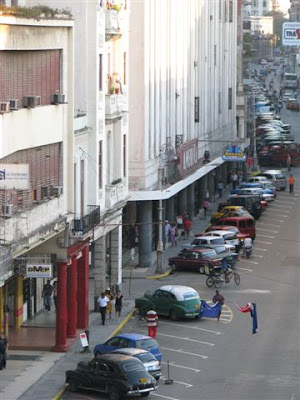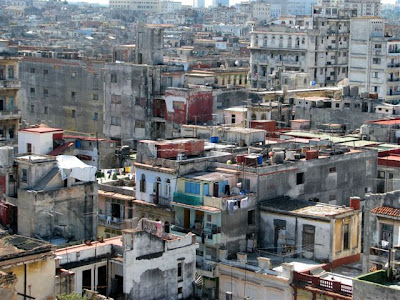H a v a n a
We'd both longed to get to Cuba, and after moving to the US it was always going to be our first port of call - before Fidel kicks the bucket and Raoul starts changing everything. It just so happened that 2009 is the 50th anniversary of the Revolution, so we figured we should be there over Christmas and new years to witness it...

Havana is a one of those cities that's more legend than fact. Since the revolution and the subsequent embargo by the US, the city has unfortunately in decline. It's probably one of the few places on the planet where you find vintage American cars running off Russian Lada engines, ration shops juxtaposed against once gleaming colonial palaces all dowsed in a liberal coating of revolutionary sloganeering and graffiti

Once the stomping ground for pirates, a heavily fortified slave port for the Spanish and even a lucrative gambling capital for the North American Mafia during prohibition, Havana seems to have survived everything that has been thrown at it...
 Habaneros (inhabitants of Havana) love their city - though they live crammed into dilapidated old apartment buildings, everyone maintains their own gardens and chicken on their balconies...
Habaneros (inhabitants of Havana) love their city - though they live crammed into dilapidated old apartment buildings, everyone maintains their own gardens and chicken on their balconies...

 This is a massive marble statue of Jesus that over looks the city from Casablanca
This is a massive marble statue of Jesus that over looks the city from Casablanca
 The fort at La Cabaña has overlooked and protected the city for over 100yrs - so much so, that Fidel and Che set up shop here immediately after the revolution. There's an awesome display of che's old office and a whole bunch of his stuff from the early days running the new country
The fort at La Cabaña has overlooked and protected the city for over 100yrs - so much so, that Fidel and Che set up shop here immediately after the revolution. There's an awesome display of che's old office and a whole bunch of his stuff from the early days running the new country

 Despite it's relatively high population, there's still not a huge amount of traffic in the old city as cars are too expensive - also you don't park on the street as you'll find your car stripped of everything that is and isn't bolted on, so abandoned lots have become parking garages where someone'll watch your sled for a few pesos...
Despite it's relatively high population, there's still not a huge amount of traffic in the old city as cars are too expensive - also you don't park on the street as you'll find your car stripped of everything that is and isn't bolted on, so abandoned lots have become parking garages where someone'll watch your sled for a few pesos...
 The balcony really seems to be the centre of a havanan home, as it's from here that you do your shopping by dropping down baskets (with money tied on); it's where you swap things with you neighbours, grow your food , keep your pets, and most importantly talk to your friends... There's a great hum in the evenings as everyone is having loud conversations from the street up to their friends on the third floor!!
The balcony really seems to be the centre of a havanan home, as it's from here that you do your shopping by dropping down baskets (with money tied on); it's where you swap things with you neighbours, grow your food , keep your pets, and most importantly talk to your friends... There's a great hum in the evenings as everyone is having loud conversations from the street up to their friends on the third floor!!

 Whilst many of the 50's US cars that everyone thinks of when they hear the word Cuba are in pretty good nick, most are barely holding on, often held together with Russian or even improvised parts...
Whilst many of the 50's US cars that everyone thinks of when they hear the word Cuba are in pretty good nick, most are barely holding on, often held together with Russian or even improvised parts...
 ... thus the easiest way to get around is by bike taxi (or in Havana - a coco taxi which is a little round yellow fibreglass blob attached to a motor bike which looks like it's been stolen from a Disney ride....)
... thus the easiest way to get around is by bike taxi (or in Havana - a coco taxi which is a little round yellow fibreglass blob attached to a motor bike which looks like it's been stolen from a Disney ride....)

 Further out , where there's less cars, horse or mule drawn wagon are the transportation of choice
Further out , where there's less cars, horse or mule drawn wagon are the transportation of choice

... or you can just build your own, however you want....

One thing that strikes most people about Cuba is that it's still a government run Communist state, and as such doesn't have any advertising or commercial branding anywhere (even on the limited number of shops...) So, while there's no Coke or Pepsi billboards staring down at you wherever you go like the rest of the planet, there are plenty of political slogans and patriotic images all about the place to remind cubanos about their responsibilities as a cuban...

"Fatherland or Death - We will win" has been a slogan since before the revolution when an "oath" was pledged to rid the country of the spanish (at the time). Since then it has evolved to mean more - that every cuban is required to fight for the greater good and the freedom on the country... Here
Fidel (in his younger days) is rousing his people...

No one man conveys that spirit of vigilance is fighting against oppression than
"El Che" who is coveted almost like a god in these parts. His image (and sometimes a simple "viva el che!" or "viva la revolucion!") can be seen in houses, on billboards, and the side of buildings, in every corner of cuba...




Another group that cubanos are constantly reminded of via billboard is the Miami 5 - five men who were sentenced in 2001 to prison terms of between 15 and 25 years for allegedly acting as Cuban agents within the exile community in Miami. The men and their supporters have consistently protested that they had come to the US to infiltrate and disrupt right-wing exile groups perpetrating acts of terrorism within Cuba and have therefore been jailed unjustly. As for the local propaganda, it's used to help bolster anti-American sentiment (such as the common phrase "Yankee imperialist..."
 "The victory was, is and always will be ours! "
"The victory was, is and always will be ours! "
 [click on image to enlarge]
[click on image to enlarge]


















































